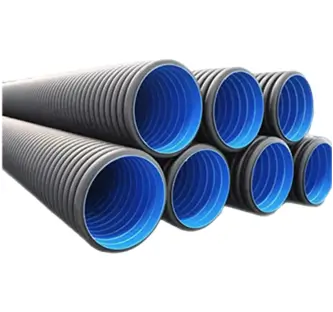Dec . 03, 2024 20:34 Back to list
High-Density Polyethylene Pipe Solutions for Agricultural Irrigation and Water Management
The Benefits of HDPE Pipe for Agriculture
In the agricultural sector, irrigation plays a critical role in ensuring optimal crop yield and quality. As the demand for sustainable farming practices increases, the significance of modern irrigation methods cannot be overstated. One of the most effective materials emerging in this domain is High-Density Polyethylene (HDPE) pipe. This article explores HDPE pipe's advantages, applications, and environmental impact, emphasizing its growing importance in agriculture.
What is HDPE Pipe?
HDPE pipe is made from high-density polyethylene resin, which offers superior resistance to impact, corrosion, and chemicals. Its versatility makes it a favored choice in various industries, including construction, water distribution, and agriculture. In agricultural applications, HDPE pipes are commonly used for irrigation, drainage systems, and water supply due to their robust nature and longevity.
Advantages of HDPE Pipe in Agriculture
1. Durability and Longevity HDPE pipes are designed to withstand harsh conditions, including extreme weather and soil erosion. Unlike traditional materials like metal or PVC, HDPE doesn’t corrode or rust, which significantly extends its lifespan. This durability translates to reduced maintenance costs and a longer replacement cycle, making it a cost-effective solution for farmers.
2. Flexibility and Lightweight The flexibility of HDPE pipe allows it to be easily installed in various terrains and tight spaces. Its lightweight nature simplifies transportation and installation, reducing labor costs and time. Farmers can adapt the irrigation systems according to the land’s specific needs, ensuring optimal water distribution.
3. Chemical Resistance Agriculture often involves the usage of fertilizers and pesticides, which can be corrosive. HDPE pipes have excellent chemical resistance, making them suitable for carrying agricultural inputs without degrading. This property ensures that the integrity of the irrigation system is maintained, ultimately protecting crop health.
4. Leak-Free Connections The butt-fusion welding method used in the installation of HDPE pipes creates strong, leak-proof joints. This reduces water wastage, a critical concern in irrigation practices. By minimizing leaks, farmers can efficiently manage water resources, leading to more sustainable farming.
hdpe pipe for agriculture product

5. Reduced Friction Loss The smooth interior surface of HDPE pipes reduces friction, allowing water to flow more efficiently through the system. This feature results in lower energy costs for pumping water, which can significantly benefit farmers in regions with high energy prices.
Applications in Agriculture
HDPE pipes are extensively used in various agricultural applications, ranging from drip and sprinkler irrigation systems to water supply for livestock. Drip irrigation, which involves delivering water directly to the plant's root zone, has gained popularity due to its water-saving potential. HDPE pipes provide the perfect solution for this technique, allowing for precise water management.
Furthermore, HDPE pipes are essential in constructing rainwater harvesting systems. Farmers can collect and store rainwater using these pipes, ensuring a reliable water supply during dry periods. This practice not only conserves water but also enhances agricultural resilience against climate variability.
Environmental Benefits
The adoption of HDPE pipes also supports environmental sustainability. By improving water efficiency and reducing wastage, HDPE pipes contribute to conserving valuable water resources. Moreover, their durability reduces the frequency of replacements, minimizing waste production over time. As the agricultural sector seeks to lower its carbon footprint, HDPE pipes present a practical solution.
Conclusion
As agriculture continues to evolve, the need for innovative solutions to enhance productivity while preserving the environment becomes increasingly important. HDPE pipes, with their robust features and numerous advantages, emerge as a transformative technology for irrigation systems. Their durability, flexibility, and efficiency not only support farmers in maximizing yields but also contribute to sustainable farming practices. In a world where water scarcity poses a significant challenge, the implementation of HDPE pipes in agriculture offers a promising path towards a more sustainable and productive agricultural landscape.
-
High-Quality PVC Borehole Pipes Durable & Versatile Pipe Solutions
NewsJul.08,2025
-
High-Quality PVC Perforated Pipes for Efficient Drainage Leading Manufacturers & Factories
NewsJul.08,2025
-
High-Quality PVC Borehole Pipes Durable Pipe Solutions by Leading Manufacturer
NewsJul.08,2025
-
High-Quality PVC Borehole Pipes Reliable PVC Pipe Manufacturer Solutions
NewsJul.07,2025
-
High-Quality UPVC Drain Pipes Durable HDPE & Drain Pipe Solutions
NewsJul.07,2025
-
High-Quality Conduit Pipes & HDPE Conduit Fittings Manufacturer Reliable Factory Supply
NewsJul.06,2025

